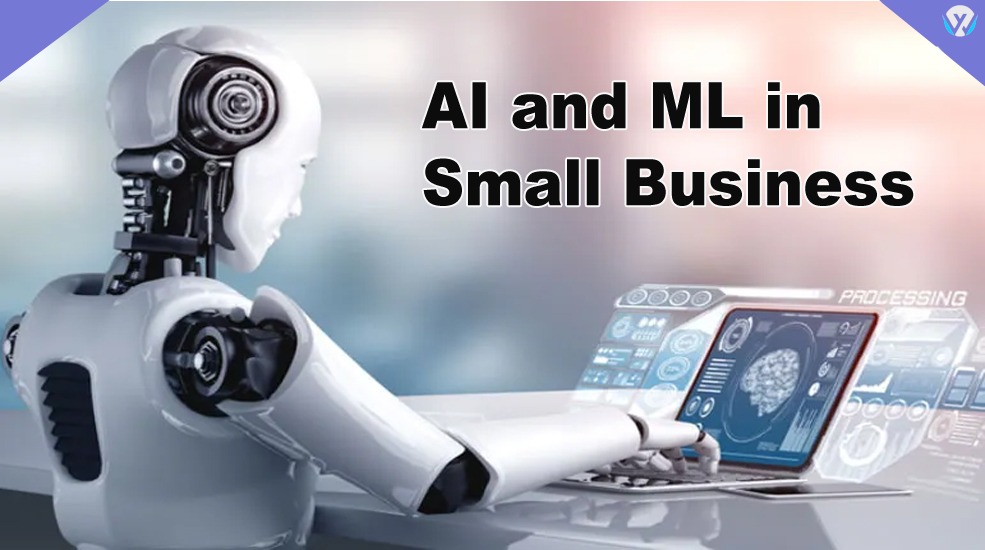Artificial intelligence and machine learning can play an integral part in minimizing the practices of achieving success in today’s small businesses. Small businesses with artificial intelligence and machine learning must progress to meet the goals that have been targeted more appropriately and effectively.
More interestingly, this is crucial to harnessing the power of technology for the survival and growth of your business. The business can unlock unprecedented opportunities and new ways to get higher with these. In this guide, you will learn all about the interesting things about how artificial intelligence and machine learning is fruitful for small businesses their benefits and some drawbacks.
What Does Artificial Intelligence and Machine Learning Mean?
Artificial intelligence (AI) and Machine learning (ML) are two connected fields with great potential for small businesses. AI mostly refers to developing computer systems components that normally need human intelligence, such as recognizing something, visual perceptions, and decision-making. But on the contrary, ML is a subset of Ai that focuses on introducing models and algorithms that enable computers to know from data and improve their performance without programming.
We may see that a small business with this impressive technology can bring various advantages that empower it to get high status. These technologies also enable small businesses to utilize their data to assist and get a competitive border in their target market. The business can play an interesting role in the competitive market by getting help from this new technical involvement.
Benefits of AI and ML in Small Businesses:
There are various benefits that can be gained whenever utilizing these interesting technologies platforms such as:
Enhanced Decision-making:
The best thing about AL and ML it can assist us in analyzing vast amounts of data and extracting valuable insights and patterns that people can look at while they are going to start a small business setup. It enables the small business to make informed, data-driven decisions. These can also increase operation efficiency and strategic planning. While becoming acquainted with these platforms, you may have time to consider certain business improvement decisions.
Improved Customer Experience:
AI chatbots and virtual assistants can help small businesses improve customer experience by providing personalized and time-sensitive service. Customers can easily be satisfied and relaxed when they find be attached to the potential business. Small business subsites can easily analyze their data to identify their preference and set their offers and marketing campaigns according to their customers’ needs and wishes.
Automation and Efficiency:
Al and ML can automate tedious operations, freeing up time for business owners and staff to focus on higher-value tasks. Automation of inventory management, order processing, and supply chain optimization saves money and boosts productivity, enhancing corporate efficiency.
Predictive Analytics:
Machine learning algorithms have access to analyze historical data to identify trends, patterns, and customer behavior. This will enable small businesses to anticipate their future market demands. The business can also have the power to make some proactive plans and learn about marketing strategies that can positively impact the business’s value. Utilizing these technology trends in your business can provide the benefits of predictive analytics in a very simple way.
Targeted Marketing:
AI-powered tools enable small businesses to develop highly targeted marketing campaigns. The business owner can recognize which marketplace suits them to thrive by analyzing customer demographics, behavior, and preferences; they can easily introduce valuable business assistance for those staying around. This leads businesses to optimize spending, increase customer engagement, and improve conversion rates.
Challenges of AI and ML in Small Businesses:
When we are getting plenty of benefits from Al and ML in small business growth, there are some drawbacks as well that we have to experience, such as:
Implementation Complexity:
Incorporating AI and ML into existing small business operations can be complex and time-consuming. It may require specialized technical expertise, and the cost of implementation can be a barrier for small businesses with limited resources. For a completely unexpert person to benefit from this technology seems challenging; quality time must be needed to integrate this into your business.
Data Quality and Privacy Concerns:
AI and ML algorithms heavily rely on quality data. Small businesses must ensure their data is accurate, relevant, and ethically sourced. Moreover, privacy concerns arise when collecting and storing customer data, necessitating strict compliance with data protection regulations.
Initial Investment and Return on Investment (ROI):
Integrating AI and ML technologies into small businesses often involves a considerable upfront investment. Small business owners need to thoroughly analyze the potential return on investment (ROI) and consider various factors that can impact implementation success. Sometimes, the business owner can not afford the yearly expenses due to no more income.
Lack of Human Touch:
While AI-powered chatbots and virtual assistants can deliver efficient customer support, some customers prefer human interaction. Many topics they wish to talk with a human, but without touching, clients grow upset. We recognize that customer pleasure depends on balancing automation and human touch.
Bias and Algorithmic Transparency:
ML and AI algorithms can inherit biases from the data they are trained on, potentially leading to unfair or discriminatory outcomes. When ensuring algorithmic transparency and implementing ethical practices to mitigate bias is essential for maintaining trust and credibility.
Wrapping up:
Artificial Intelligence and Machine Learning may transform small firms’ operations, decision-making, and consumer interactions. These technologies give small businesses a competitive edge, productivity boost, and expansion potential. However, it is important to carefully consider the implementation challenges, such as complexity, data quality, privacy concerns, and initial investment costs that sometimes appear not as good as the customer wants. You must get insistence on these interesting technologies’ inventions to increase your business development.


